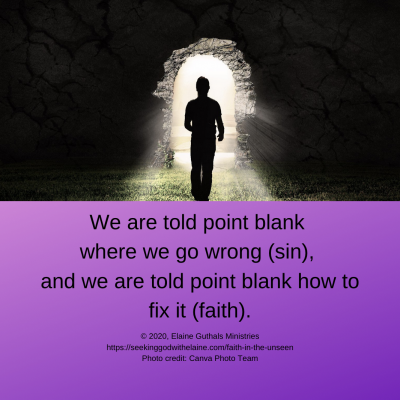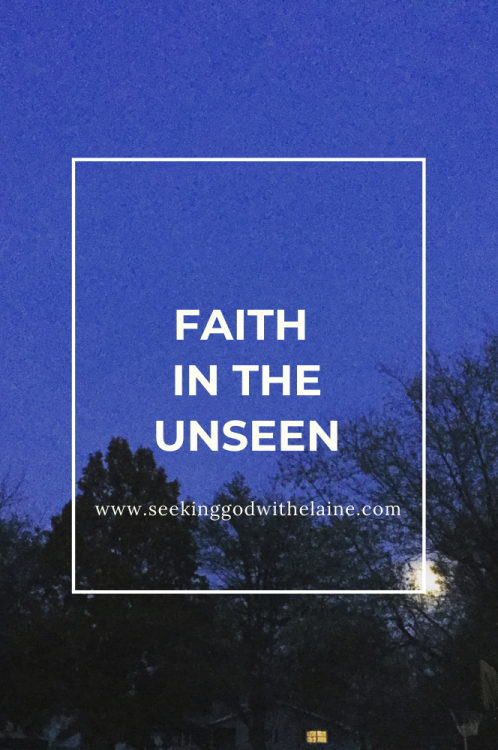The foundation of the restoration of our relationships with God is faith. However, we must believe in the unseen and the unknown. This daily devotional shows how disciples of Christ can have faith in the unseen.
Nuggets
- A major component of our faith is believing in the unseen and the unknown.
- Faith is built on trust.
- Jesus didn’t want Thomas to stay in his doubtful stage. He wanted him to be blessed.
- Faith is the foundation of our redemption.
Devotions in the The Unseen Spirit World series

Faith can be a difficult concept for someone searching to know God to understand. Couple that with the fact that it is faith in the unseen, the difficulty rate doubles.
Let’s see what we can find out about it.
Let's Put It into Context
The Holman Bible Dictionary didn’t have spiritual world and couldn’t give us a definition of spirit. The best they did was to say was “the kinship of spirit, breath, and wind is a helpful clue in beginning to understand spirit.”
Resource
Hmmm. Three invisible things.
Bartol made the connection between faith and the spirit/heavenly world. That world must align with our faith in the same way that this physical world aligns with our senses.
Resource
How Are We to Have Faith in the Unseen?
“Now faith is the substance of things hoped for, the evidence of things not seen” (Heb. 11: 1 KJV)
Faith is the conviction that the doctrines revealed in God’s Word are true, even if we do not understand all aspects of them, a belief which impacts our lives. A major component of that is believing in the unseen and the unknown.
Temple pointed out that Hebrews 11: 1 is the only place where we get the definition of faith. That makes it pretty important.
Resource
- Think about it. Are the other churchy words really specifically defined in Scriptures?
Sin is specifically defined. “Everyone who sins is breaking God’s law, for all sin is contrary to the law of God” (I Jn. 3: 4 NLT).
I did a quick look up of a couple of other words. What I found was we have to put a couple of verses together to determine the definition. Bible writers didn’t have my Dictionary Chick mentality that we need a firm foundation of what is specifically meant.
I think it is really telling that sin and faith are the only two words I found specifically defined. We are told point blank where we go wrong (sin), and we are told point blank how to fix it (faith).

We can’t say we are redeemed in any other way. The how and the why isn’t really important.
You should really read Melvill’s sermon. I am going to try to summarize it here. But it is a great read on what faith is and isn’t.
- Melvill said that the writer of Hebrews is talking about the act of believing, not what we are believing.
- This makes sense to me. It is ABCD, not just ABC. Faith in God has to change us to be more like God.
- On the flip side, it isn’t just D. We have to ABCD, or D is just acts and could have nothing to do with God.
- There are different senses of faith: historical, temporary, faith of miracles.
- Historical faith is a simple agreement with what we read.
- I would categorize that under ABC.
- Melvill brought up the “So you see, faith by itself isn’t enough. Unless it produces good deeds, it is dead and useless” verse (Jas. 2: 17 NLT).
- Temporary faith is just that — here today, gone tomorrow.
- Jesus described that kind of faith in the parable of the sower. “As he was scattering the seed, some fell along the path, and the birds came and ate it up” (Mt. 13: 4 NIV).
The miracle faith is a belief in power. However, Melvill cautioned that “many had faith in Christ’s power to heal their bodies who knew nothing of Him as the Physician of their souls.”
- Oh, yeah. Aren’t we sometimes like the Jews in Jesus day? We focus on what Jesus can do for us rather than Who He is. This life isn’t the priority — our spiritual condition is.
- “Things hoped for” means it doesn’t have substance now. But faith is “… the substance of things hoped for …” (Heb. 11: 1 KJV).
- Faith makes the things we hope for in the future tangible now. It switches them from hope to reality.
- “… the evidence of things not seen” (Heb. 11: 1 KJV) takes it out of our senses and reasoning.
- In other words, we have faith even though we don’t understand it. We don’t see how creation can be possible, but we have faith that God created the universe. We didn’t see God create the universe, but we see the universe God created. We didn’t see the donkey talk, but we read about it in His Word.
- It is more than just believing Jesus the Man lived.
- We have to believe that Jesus was the Messiah, dying to restore our relationships to God. We have to believe that He paid the penalty for our sins.
- Melvill wrote, “Unseen things, which, if they exist at all, must immeasurably transcend things seen, cannot be as certain to a man as things seen, if that man give them not the preference, and far more if he treat them with neglect …”
- We can’t rely on what we see. This is the spirit world here, so we have to go with unseen things.
- Believing with our hearts and minds, we must believe in “… the evidence of things not seen” (Heb. 11: 1 KJV).
- We have to have faith that our sins are forgiven because of the sacrifice made by Jesus.
- Melvill gave us a list of things hoped for: “… pardon of sin, the gift of righteousness, and admission to the kingdom of heaven.”
- That is the bottom line of our faith.
- The assurance we have is, as Melvill said, “… faith in our faith …”
- Because we have faith, we can believe we are heirs of God and live our lives accordingly.
Resource
The ABCDs of Salvation
If you have not become a believer in Christ, please read through the
Plan of Salvation and prayerfully consider what God is asking you to do.
A – admit our sins
B – believe His Son Jesus is our Redeemer
C – confess God as Sovereign Lord
D – demonstrate that commitment by making any changes needed in our lives to
live the way in which God has called us
The Disciple’s Job Description
The New International Version uses confidence and assurance. Yes, we are talking about the unseen here. That doesn’t shatter our confidence.
We can have the assurance that it is reality. We have that assurance because the Scriptures deal in the Truth.
Devotions in the What Is Truth? series
I think one of the things that makes it so hard is that we are just relying on our minds. Yes, we have great minds that can reason things out and work through any problem.
But that is just it. We are again trying to understand. We have to let go and believe. Faith takes care of the invisible things.
Faith is built on trust. Dale wrote, “It was not by offering sacrifices, nor by attending festivals, nor by the pomp and exactness with which they had celebrated any external rites and ceremonies, that the noblest of their forefathers had won their greatness, but by their firm and steadfast trust in God.” We have to believe God will do what He says He will do.
Resource
What does faith give us?
- Hope
- Possession of our inheritance
- Security in Jesus
- Benefits
Resource
Blessed Are the Believers Who Have Not Seen
“Jesus said, ‘Because you have seen me, you have believed. Blessed are those who have not seen and yet believe’” (Jn. 20: 29 CSB)
The Scriptures gives us an example of what Jesus meant when He said believe without seeing. Thomas rocked the I’ll-believe-it-when-I-see-it mode.
Thomas wasn’t hanging out with the other disciples when Jesus showed up for the first time (Jn. 20: 24). We give him a hard time because he didn’t believe his friends right off. He demanded physical evidence.
That evidence came a week later. Jesus showed up again, but this time, Thomas was there. Jesus invited him to examine Him as Thomas said he needed. “Then he said to Thomas, ‘Put your finger here and look at my hands. Reach out your hand and put it into my side. Don’t be faithless, but believe’” (Jn. 20: 27 CSB).
We bite on Thomas for doubting. Jesus didn’t really. He showed that He knew of Thomas’ doubts and was ready to provide the evidence he needed for belief.
But Jesus did call Thomas to belief. He didn’t want Thomas to stay in his doubtful stage. He wanted him to be blessed.

Making the Connections
Faith is the foundation of our redemption. We are told to “… walk by faith, not by sight” (II Cor. 5: 7 CSB). Faith is only the beginning. We have to follow it up by a life lived for Him.
We have to watch, though, what emphasis we put on that life. Yes, we don’t want to be the nominal disciple who gets to Heaven and doesn’t make it in (Mt. 7: 21).
But we also have to remember what Jesus said when talking to the crowd after He had walked on the water. They knew He hadn’t gotten on the boat but didn’t know how He had gotten there. He accused them for running with Him only so He could feed them.
“They replied, “We want to perform God’s works, too. What should we do?” Jesus told them, “This is the only work God wants from you: Believe in the one he has sent.” (Jn. 6: 28-29 NLT).
Resource
We can believe and not do the works — like the repentant dude on the cross. He didn’t have time to do anything. So, the belief is what saves us, not the works.
But we just said, if we scroll back up, that “… faith by itself isn’t enough. Unless it produces good deeds, it is dead and useless” verse (Jas. 2: 17 NLT).
We don’t need works to be saved. We need works to prove our salvation.
This faith is on promises from God’s Holy Word. It isn’t based on worldview promises or knowledge. It is solely based on the Creator of the universe.
Spurgeon cautioned us that we should not want to wish we could see Jesus face to face or hear His voice. We shouldn’t expect a miracle so that we have evidence of what God is calling us to do. That lessens our faith.
Instead, Spurgeon said that we need to believe practically, intensely, continually, personally, and thoroughly. That is the only way we will show God that we are completely faithful to Him. If any of these requests would be answered, it would be belief by sight.
Resource
Making the Connections to Self-Discipline
Irons made an interesting observation. He wrote, “… that the believer hopes to know more and to enjoy more of Christ to-day than he did yesterday, or than ever he had done before. Faith is the substance of it. The believer in Jesus hopes to be more conformed to the image of Christ …”
Resource
In order to do that, we have to seek God.
Searching for and Seeking God
Hearing His Word (Rom. 10: 17).
Reading His Word (Rev. 1: 3).
Praying to Him (Heb. 4: 16).
Studying His Word (Ac. 17: 11).
Meditating on His Word (Ps. 1: 1-2).
Memorizing His Word (Ps. 119: 11).
How Do We Apply This?
Temple showed us how to put faith into practice. He wrote, “To throw ourselves on these promises, to purify ourselves in the full assurance that Christ’s love can carry us through all that we shall encounter, to cling to Christ not only in spite of pain and darkness, and strange perplexity, but in spite of our own sins also, this is our substance of things hoped for, this is our evidence of things not seen, this is Christian faith. This is, St. John tells us, the victory which overcometh the world. This is the power which, both in great things and in small, both in hard trials and in easy, ever supports the disciple of Christ by bringing within his reach all the strength of his Master.”
Resource
Owen said we do all that by making our faith into visible things. We show how much God loves us to others. We show how far He was willing to go to save us by doing the same.
Resource
Faith by definition is belief of the unseen. We must give up our need for control and understanding and fully believe on God.
Father. Jesus walked this earth over 2,000 years ago. All we have is Your Word to go on. We believe it to be true. We put our faith and trust in You. Amen.
What do you think?
Leave me a comment below (about this or anything else) or head over to my Facebook group for some interactive discussion.
If you don’t understand something and would like further clarification, please contact me.
If you have not signed up for the email daily or weekly providing the link to the devotions and the newsletter, do so below.
If God has used this devotion to speak with you, consider sharing it on social media.
Pingback: Applying the Spiritual World to Everyday Life – Seeking God with Elaine
Pingback: Attributes of God: Mysterious and Incomprehensible – Seeking God with Elaine